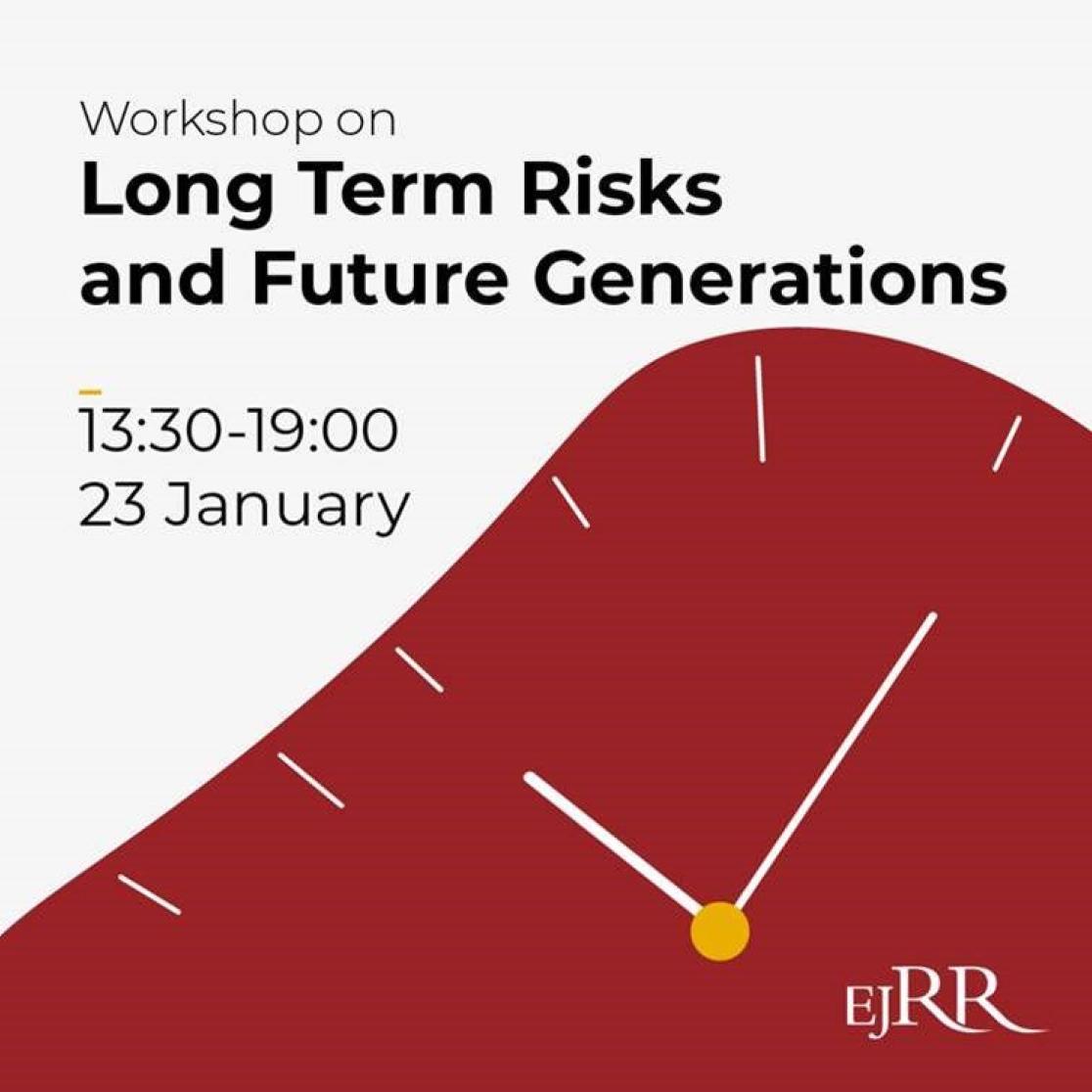Workshop on Long Term Risks and Future Generations
A short-term culture dominates today's political, financial, social and cultural systems. As a result, future generations are generally neglected in governance. While some moral philosophers argue that future generations should be given a similar weight to the well-being of those alive today, mainstream economists tend to give far less consideration to long-term thinking. Contrary to its original long-term ambition, the European Union – and its 27 Member States – is no exception.
This workshop will bring together social scientists interested in how to integrate the interests of future generations into policymaking processes, laying the foundations for a research agenda on long-term governance at national, European and international level.
Supported by the International Center for Future Generations, it will consist of brief presentations of draft papers to be published in the special issue of the European Journal of Risk Regulation (EJRR) followed by input from discussants coming from both academic, public and private practice and questions from the audience. Discussion will be informal, seeking the points of view of policy-makers and scholars as well as the large public.
This is a hybrid event. While space for participation on site is limited, registration is also open for online participation.
The workshop is co-convened by Alberto Alemanno (HEC Paris) and Bas Heerma van Voss (Radboud University)

Agenda
- 12:30 - 13:15 - Registration open for those attending on-site and light lunch
- 13:15 - 13:30 - Welcome address by Professor Mariolina Eliantonio (Director of the Maastricht University Campus in), Professor Alberto Alemanno (HEC Paris) and Bas Heerma van Voss (Radboud University)
- 13:30 - 13:45 - Setting the scene: Protecting the Future People's Future: How to operationalise present people's unfulfilled promises to future generations? Alberto Alemanno (HEC)
First session: How to give future generations a voice in politics?
- 13:45 - 14:10 - Political institutions and long-term risks: how parliaments can make a difference: Vesa Koskimaa (Tampere University), Tapio Raunio (Tampere University) - joining online. Discussant: Anthony Teasdale (LSE) - joining online
- 14:10 - 14:30 - How to Open Democratic Representation The Future of Representation? Manon Revel (Harvard/MIT) - joining online. Discussant: Daniela Heimpel (Centre Marc Bloch)
- 14:30 - 14:55 - Intergenerational Justice as a Lever to Impact Climate Policies? - Lessons from the Complainants Perspective on Germany’s 2021 Climate Constitutional Ruling. Till Steinkamp (ERCC). Discussant: Luca de Carli (European Commission - DG CLIMA)
- 14:55 - 15:15 - Remarks by Fabienne Corvers (European Commission - Secretariat General, Directorate A 'Strategy, Better Regulation & Corporate Governance')
- 15:15 - 15:30 - Coffee Break
Second session: Future generations in governance of products and technologies
- 15:30 - 15:55 - Longtermism and regulation by design: friends or foes? Marco Almada (European University Institute) - joining online. Discussant: Martin Ulbrich (European Commission - DG Connect)
- 16:00-16:25 - EU regulation of artificial intelligence to preserve consumer autonomy in the long term. Sébastien Fassiaux (Universitat Pompeu Fabra). Disscussant: Alessandro Spina (European Commission - Legal Services and University of Fribourg)
- 16:30 - 16:55 - Unhealthy Products, Noncommunicable Diseases and Future Generations. Andrés Constantin (O'Neill Institute) - joining online. Discussant: Daniel Bertram (European University Institute) - joining online
- 17:00 - 17:15 - Coffee Break
Third session: Future generations and systemic risks
- 17:15 - 17:40 - Mitigation of Long Term Risks and the Role of Insurance: A Behavioral Law and Economics Perspective. Michael Faure (Maastricht University), Qihao He (China University of Political Science and Law ) - joining online. Discussant: Pierpaolo Settembri (European Commission - DG Move)
- 17:45 - 18:10 - Prevention cycle. Bas Heerma van Voss (Radboud University). Discussant: Max Reddel (ICFG) - tbc
- 18:15 - 18:40 - Existential Terrorism: Can Terrorists Destroy Humanity? Zachary Kallenborn (Schar School of Policy and Government), Gary Ackerman (University of Albany) - joining online. Discussant: Nicolas de Sadeleer (USL - Brussels) - tbc
- 18:45 - 19:00 - Concluding Remarks. Elizabeth Dirt (ZOE Institute for Future Fit-Economies) - joining online, Professor Alberto Alemanno (HEC Paris), Bas Heerma van Voss (Radboud University)
Alberto Alemanno
Alberto is Jean Monnet Professor in European Union Law at the HEC Paris and permanent visiting professor at the University of Tokyo School of Public Policy and the College of Europe in Bruges. He is the founder as well as the editor-in-chief of the European Journal of Risk Regulation. He has written extensively on risk regulation, public health, consumer rights, food policy as democratic innovation, participatory and deliberative democracy. As founder of The Good Lobby he is committed to strengthen the advocacy capacity of civil society and make corporate political influence more accountable and sustainable.
Bas Heerma van Voss
Bas is a Phd Candidate at Radboud University (NL) focusing on the topic of how states deal with long-term destabilising risks. He has worked as policy advisor for several Dutch public institutions, including the Ministry of Economic Affairs and Climate Policy. Currently he works as an economist at the Netherlands Central Bank.
Also read
-
IGIR Expert Lecture Series
Trump & trade wars, Europe between Scylla & Charybdis By John Clarke (former EU Chief Agriculture Negotiator and former Head of the EU Delegation to the WTO and UN in Geneva)31 Dec -
1 Jan31 Dec
-
Data Protection Officer (DPO) Humanitarian Action Certification
Training and certification programme specifically designed for Data Protection Officers in Humanitarian Action.1 Jan31 Dec